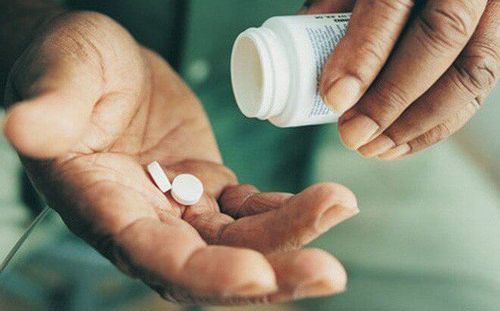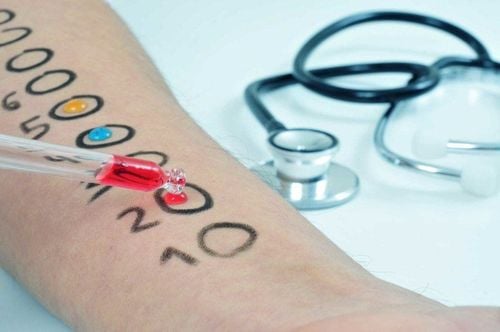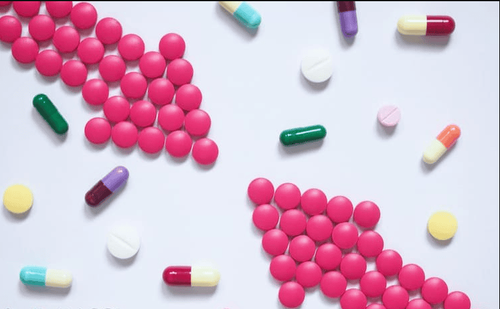This is an automatically translated article.
Clindamycin is an antibiotic that can be used to treat bacterial infections. The use of antibiotics should comply with the doctor's instructions, do not arbitrarily use because it will increase the risk of drug resistance.
1. What disease does Clindamycin HCl treat?
What is Clindamycin HCl? Clindamycin is an antibiotic used to treat many bacterial infections. Clindamycin suppresses bacterial growth through inhibition of bacterial protein synthesis.
The antibiotic Clindamycin is only effective in treating bacterial infections. The drug is not effective against viral infections such as the common cold and flu. The use of antibiotics should be prescribed by a doctor, patients should not buy antibiotics for themselves. The indiscriminate use of antibiotics can cause drug resistance, antibiotics will not be effective when treating the disease later.
Clindamycin HCl medicine is used as follows:
The drug is usually taken 4 times a day (6 hours every 6 hours), can be taken with or without food as directed by your doctor. Patients should take the medicine with a full glass of water about 240ml. Note, do not lie down for at least 10 minutes after taking the medicine. The dose of Clindamycin antibiotic is prescribed by your doctor based on your health status, weight, and response to treatment. For antibiotics to be most effective, take them exactly as directed by your doctor. Do not take the medicine even if the symptoms of the infection disappear. Stopping the medication too soon can cause the infection to return. To make it easier to remember to take your medication, take it at the same time each day. Tell your doctor if you feel your infection is not getting better or is getting worse while taking this medicine.

Thuốc Clindamycin HCl có tác dụng điều trị các bệnh liên quan đến nhiễm khuẩn
2. Clindamycin HCl side effects
During the use of the drug, the patient may experience side effects such as nausea, vomiting, diarrhea. If side effects are severe or persist, tell your doctor or pharmacist.
Serious side effects that can be encountered when taking the drug include: heartburn, joint pain, jaundice, yellow eyes, dark urine. Long-term or repeated use of Clindamycin can cause oral thrush or vaginal yeast infection. Contact your doctor if you notice white patches in your mouth, a change in vaginal discharge, or other unusual symptoms.
Serious allergic reactions to the drug are very rare, but can seriously affect the patient's health. Symptoms of a serious drug allergy include: fever that doesn't go away, new or worsening swollen lymph nodes; rash; itching, swelling (especially in the face, tongue, throat); severe dizziness; shortness of breath. When having the above symptoms, it is necessary to take the patient to medical facilities for timely treatment.
The above is not a complete list of the possible side effects of Clindamycin HCl medicine. If you notice other side effects not listed above while taking this medicine, contact your doctor or pharmacist for advice.

Tiêu chảy là một trong những tác dụng phụ của thuốc
3. Precautions when using Clindamycin
Before taking Clindamycin HCl, tell your doctor or pharmacist if:
You are allergic to Clindamycin, Lincomycin or have any other allergies to drugs or foods. You have a history of liver disease, kidney disease, gastrointestinal disease (such as colitis, Clostridium difficile diarrhea), allergic conditions (such as asthma, eczema, etc.) . You are pregnant or breastfeeding. Depending on the patient's condition, the doctor will make appropriate adjustments when prescribing.
The antibiotic Clindamycin can make live attenuated vaccines inactive (eg typhoid vaccine). Therefore, live vaccines should not be given while using Clindamycin HCl unless directed by your doctor.
Elderly people may be more susceptible to Clindamycin side effects, a common side effect is persistent diarrhea.
4. Drug interactions
Drug interactions can change the way the drug works or increase the risk of serious effects. To limit the risk of drug interactions with drugs used concurrently with Clindamycin, patients need to tell their doctor about all medicines they are using including prescription drugs, over-the-counter medicines, herbal medicines. Patients should not arbitrarily use, stop using or change the dosage of any medicine without the approval of the doctor.
Drugs that have been shown to interact with Clindamycin are:
Kaolin-pectin: this is a drug commonly used in the treatment of diarrhea. Kaolin-pectin may reduce the absorption of clindamycin. Oral steroid contraceptives: Clindamycin may decrease the effectiveness of oral steroid contraceptives. Erythromycin: Clindamycin and Erythromycin act on the site of action on bacterial ribosomes. When two drugs are taken at the same time, they can inhibit each other's effects.

Thuốc Clindamycin HCl có thể gây ra một số tương tác nhất định
5. Some other notes in using Clindamycin HCl drug
5.1. Treatment of drug overdose
If the patient uses an overdose of Clindamycin and has serious symptoms such as fainting or difficulty breathing, take the patient to the nearest medical facility for timely treatment.
5.2. What to do if you forget to take a dose of Clindamycin HCl?
If you forget to take a dose of Clindamycin HCl, take it as soon as you remember. If it is almost time for your next dose, skip the missed dose and take your next dose at the usual time. Do not take a double dose of Clindamycin HCl to make up for a missed dose.

Khi quên uống một liều thuốc Clindamycin HCl, bạn hãy uống lại ngay khi nhớ ra
5.3. Clindamycin HCl drug storage
Store Clindamycin HCl at room temperature below 30 degrees Celsius, avoid direct light and high humidity. Keep the medicine out of reach of children for safety.
Note Clindamycin is an antibiotic, prescribed by a doctor for an existing infection. You should not self-medicate for future infections, unless approved by your doctor.
To prevent unwanted complications, especially to limit the risk of extremely dangerous antibiotic resistance, you need to consult a doctor or pharmacist before use.
Please dial HOTLINE for more information or register for an appointment HERE. Download MyVinmec app to make appointments faster and to manage your bookings easily.
Reference source: webmd.com













